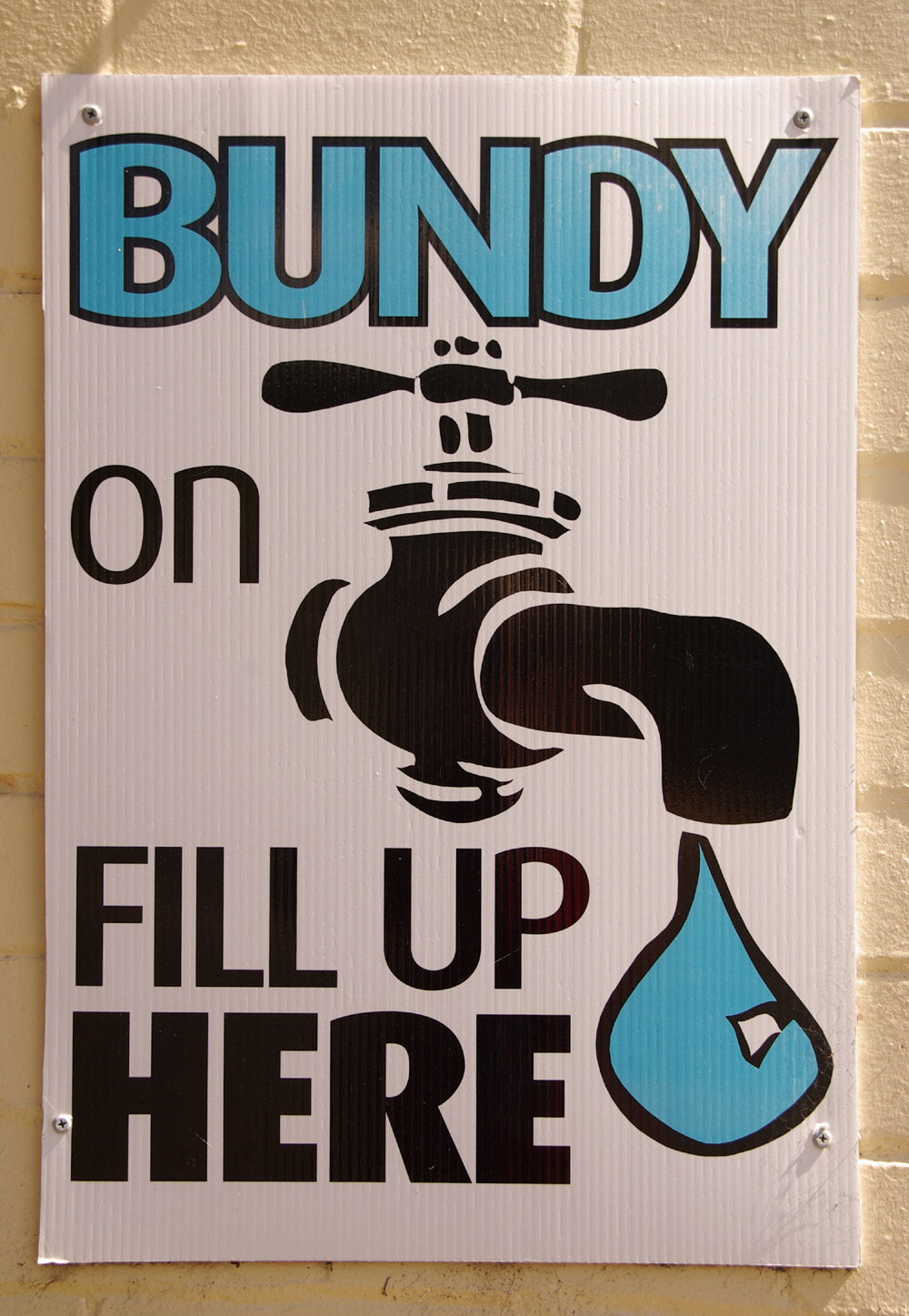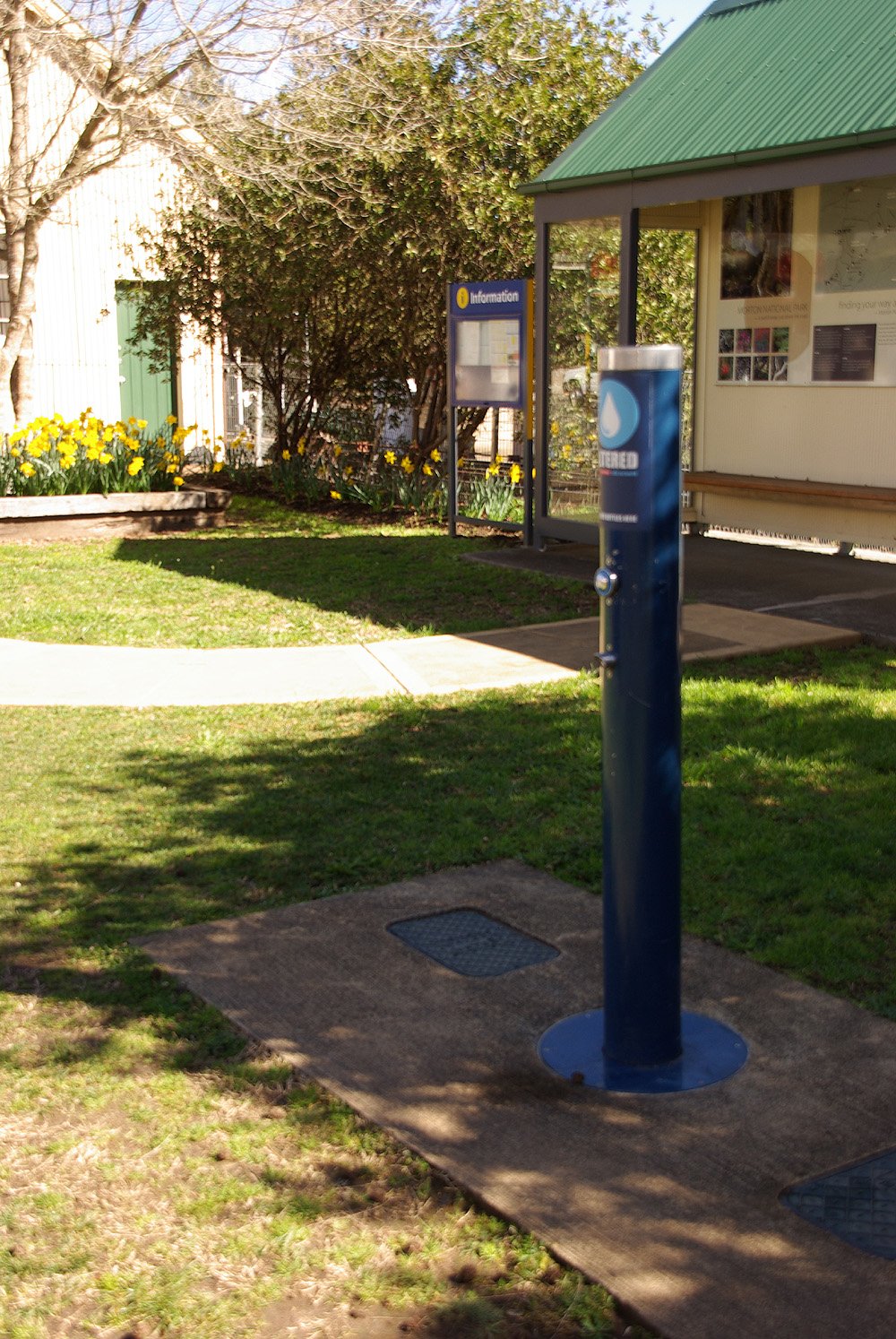''Don't Bore Bundanoon'' and ''Bundy On Tap''
''Bundanoon - the world's first bottle-water-free town''“Don’t Bore Bundanoon” and “Bundy on Tap
A brief history of how Bundanoon became the world’s first bottled-water-free town
In the Beginning
The owners of a property within the village precinct sought Council approval to extract 50 million litres of water annually from their bore. Concern about the impact this would have on village life – the environmental issue of aquifer depletion coupled with a stream of tankers driving past the primary school and through the middle of the village – saw residents galvanised into action. The Don’t Bore Bundanoon campaign hit the ground in 2006.
A Spark Lights the Fire
Following several years of action by the community campaigning against the bore, local businessman, Huw Kingston, penned an article in the village magazine, Jordan’s Crossing Gazette, titled “A Town with No Bottle”. Huw wondered if it was hypocritical to oppose the bore while purchasing the very same single-use, disposable bottles of water that might ultimately be supplied by the bore. Should the town walk-its-talk by getting out of the buying and selling of commercialised water? The notion resonated with so many people that a sub-committee to work out if such a proposal was indeed possible was formed (as part of the Bundanoon Community Association). The planets aligned to see a group of passionate and talented community members and others come together – health professionals, graphic designers, business owners and researchers. Bundy on Tap was born.
The Mouse that Roared
On 8 July 2009, the town voted 355 to 1 to go “bottled-water-free”, and a worldwide media storm erupted. National and international interest generated the equivalent of more than $10 million worth of media focused on the issue of paying for what comes almost free from our taps. The story ran across the media worldwide – from the New Zealand Herald, China Post, New York Times, The Guardian, Al Jazeera, Kazakhstan News and just about every other media outlet in between. Bundy on Tap was the number one news story across Australia. Bundanoon had no idea that its community work started in 2006 and the actions culminating at the Town Meeting in the winter of 2009 would have such a profound global effect. Yet they did.
Winds of Change
It is one thing to be philosophically enthused by a project, but another to have your financial livelihood impacted. Bundy on Tap worked tirelessly to bring about strategies which would see local businesses, not just the environment, benefit by not selling bottled water. A true win-win-win was sought. Drinkers were provided with conveniently located fountains and refill stations. Retailers were provided with in-store chilled water dispensers and a supply of reusable bottles to sell. Additionally they received promotional signage and public acknowledgement of their contribution to the campaign.
Contrary to the headlines that proclaimed ‘Bundanoon Bans Bottle’, there was never any ban: there was a voluntary Memorandum of Understanding that commerce would support the community in the venture. Local MP, Pru Goward, noted in the NSW State Parliament: “it is courageous on the part of local retailers and it is taking a stand against life’s essentials being turned into commodities. Not everything should be bought and sold.” She further noted that what had happened in Bundanoon “demonstrated the amazing power a community can wield once its people are of a mind to work together. It is really quite daunting.”
On 26 September 2009 the last bottles of “still” bottled water were removed from the retail shelves of Bundanoon.
David and Goliath
Single-use bottled water is a massive industry. The global market for bottled water was worth over US$157 billion in 2010. A beverage juggernaut and the success of a significant marketing campaign overcame common sense. 91% of Australians say they are satisfied with the quality of their (tap) water, yet they spent more than $680 million in 2010 buying water in throwaway bottles. Paying more than 3,000 times the cost to get the same thing from a tap. Paying double the price of petrol.
One might think that a grassroots initiative in a tiny country town would not pose much of an affront to such marketing dominance. But the media on every continent knew better. For them the story was akin to the bespectacled wimp kicking sand in the face of the beach bully. For not only had Bundanoon’s shops and cafes gone bottled-water-free, so had the local primary school, as well as Brigadoon, the largest Scottish festival in the Southern Hemisphere, and the Highland Fling, a prestigious mountain bike event. And, very soon, the ripple effect spread wider.
The Premier of NSW announced that state government premises would phase out sale of bottled water. Students at a secondary girls school in North Sydney opted to go bottled-water-free. The University of Canberra followed suit. A resort on the Great Barrier Reef ceased the sale of water in plastic bottles. Concord, a town of 20,000 near Boston in the USA, voted to ban the sale of single-serve bottled water. Nearly twenty US National Parks went bottled-water-free. Summer Bay, the fictitious town in Channel 7’s TV soap opera Home and Away, voted to become bottled-water-free.
Bundy on Tap may not have been the direct catalyst for all these and many, many other moves to curb the madness that is bottled water, but it certainly provided inspiration and oxygen to an environmental debate that rages on.
Barbs and Bravos
Given the gigantic scale of the industry that this campaign was questioning, the venture did not go undisputed. Industry-funded voices were soon decrying the endeavour across the world. Newspaper pundits, letters-to-the-editor, blogs and videos on social media decried the idea.
All seemed to forget, however, that this was no “top-down” decree. It was a choice made by the Bundanoon community itself. Indeed, much correspondence was received from people praising the town for its verve in challenging the status quo. Many expressed the wish that their communities could be as brave.
In the days immediately surrounding the vote in favour of the Bundy on Tap proposal – that Bundanoon become a bottled-water-free town – Huw Kingston fielded more than 200 media interviews. Jon Dee, of the environmental advocacy group, Do Something!, who had assisted the campaign, was similarly run off his feet with media engagements. Later on there would be a French language documentary, a case study in a British book on recycling, inclusion in school curriculums, a display in Sydney’s Powerhouse Museum’s permanent exhibits, EcoLogic, and much more. Bundy on Tap won the village a Tidy Town Award for litter reduction. Huw Kingston would collect a number of awards, including being listed among Time Magazine’s 25 Worldwide Responsibility Pioneers. Jon Dee was that year named NSW Australian of The Year.
The Issues
- Bottled water has a carbon footprint around 300 times greater than tap water.
- Bottled water production has about 2,000 times the energy cost of producing tap water.
- Approximately 200ml of oil is required to provide each litre of bottled water found in a shop fridge.
- Australian bottled water consumption equates to the annual greenhouse emissions of 13,000 cars.
- Some 65% of single-use beverage bottles are not recycled and end up as litter or landfill.
- There are far more stringent safety standards on tap water than on bottled water.
- Bottled water is sometimes produced directly from the same source as municipal tap water.
- In blind taste tests, drinkers cannot accurately identify bottled water from tap water.
- Non-fluoridated bottled water may be contributing to a sudden rise of tooth decay among children.
The Facts
- Don’t Bore Bundanoon and Bundy on Tap are grassroots initiatives embraced by the community.
- There is no “ban” on single-serve bottled water, just a non-binding agreement.
- Village businesses were provided with solutions that compensated for any loss of income.
- Village businesses voluntarily support the community action.
- The agreement covers only ‘still’ water’ – carbonated water is still available.
- Bundy on Tap only targets ‘still’ water, because that is what already comes from our taps.
- Bundy on Tap acknowledges the necessity of bottled water for humanitarian or disaster relief.
- Choice was not limited – it was increased. Refillable bottles and free tap water are now more widely available.
- Carbonated drinks have not taken over. Fountains and refill stations provide free water at sports fields and along the main street.
- Evolving from Don’t Bore Bundanoon, begun in 2006, Bundy on Tap, conceived in 2009, continues today. Bundy on Tap was no short-lived flight of fancy.
- It has now spun-off a nationally focused initiative: Australia on Tap.
For more information visit https://bundanoonontap.com/
The Bundanoon community thanks local businesses, the members of the Bundy on Tap BCA Sub-Committee, the BCA, and the initial Don’t Bore Bundanoon group for the significant outcomes achieved and for all that was accomplished in the very beginning.
BCA INC SECRETARY
Bundanoon Community Association PO Box 12 Bundanoon NSW 2578 Email: secretary@bca.asn.au
HALL HIRE
Bundanoon Community Association PO Box 12 Bundanoon NSW 2578 Email: HallHire@bca.asn.au
For current rates for hiring the Hall and other equipment, including pianos, please consult the Hall Sub-committee page for details and forms
BCA MONTHLY MEETINGS
Bundanoon Community Noticeboard![]() and Lovely Bundanoon are the unofficial Facebook pages of Bundanoon.
and Lovely Bundanoon are the unofficial Facebook pages of Bundanoon.

